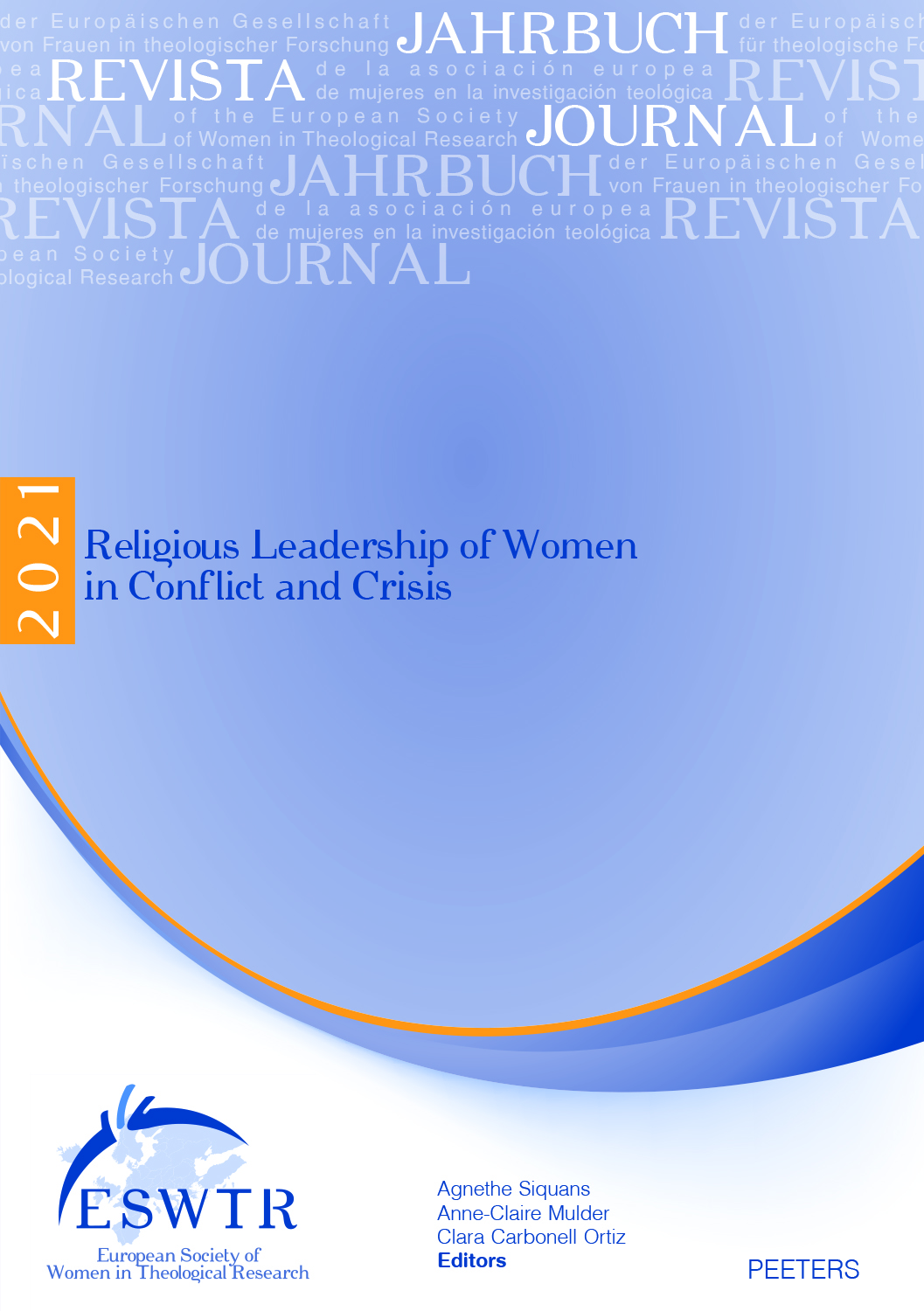 previous article in this issue previous article in this issue | next article in this issue  |

Preview first page |
Document Details : Title: The Gender Perspectives of the Economic Crisis in Greece and the Greek-Orthodox Church's Witness in Troubled Times Subtitle: Charity Meals or a Quest for Justice? Author(s): ATHANASOPOULOU-KYPRIOU, Spyridoula Journal: Journal of the European Society of Women in Theological Research Volume: 23 Date: 2015 Pages: 117-129 DOI: 10.2143/ESWTR.23.0.3103635 Abstract : Greece is now sunk in its seventh straight year of recession, and it is no longer easy to predict the results of this situation in our life. It goes without saying that the Greek economic crisis as part of the global financial crisis caused many changes in Greek society. Much has been said about the negative impact of this crisis on many aspects of public life, such as public education, public health care and especially democratic governance. However, little attention is given to the gender perspectives of the economic crisis in Greece. In the midst of the raging socio-economic crisis that has hit Greece since 2008 the Orthodox Church of Greece, under Archbishop Ieronymos II, has admirably developed its network of philanthropic work and charity meals. Open to both Greeks and immigrants, this project tries to realise Eastern Orthodox Christianity’s sense of caritas and civic duty. However, the Orthodox Church fails to tackle the structural causes of the crisis in a politically relevant and gender sensitive manner and remains discursively distant from theological and political criticism of a greedy neoliberal system and from effective engagement with justice and gender equality. In this paper, I begin with explaining in what sense women are more vulnerable than men to the economic shocks in Greece. Then, I examine the role that the Orthodox Church plays in the overcoming of the crisis and I argue that the Church fails to deal with the causes of the crisis in a politically relevant and gender-sensitive manner. Finally, I make some suggestions regarding the relevance of theological discourse in troubled times. Griechenland ist jetzt im siebten Jahr der Rezension und die Folgen dieser Situation auf unser Leben lassen sich nicht mehr einfach vorher sagen. Selbstverständlich verursachte die griechische Wirtschaftskrise als Teil der globalen Finanzkrise viele Veränderungen in der griechischen Gesellschaft. Viel ist über die negativen Folgen dieser Krise für viele Bereiche des öffentlichen Lebens, wie Erziehung, Gesundheitssystem und vor allem demokratische Regierung, gesagt worden. Den Gender-Perspektiven der Wirtschaftskrise in Griechenland wurde jedoch bisher wenig Beachtung geschenkt. Mitten in der rasenden sozio-ökonomischen Krise hat die griechisch-orthodoxe Kirche unter Erzbischof Hieronymus II. ihr Netzwerk philanthropischer Werke und Suppenküchen bewundernswert entwickelt. Offen für Griech/innen und Migrant/innen versucht dieses Projekt die Werte von Caritas und Bürgerpflicht der östlichen Orthodoxie zu realisieren. Die orthodoxe Kirche nimmt sich jedoch nicht der strukturellen Ursachen der Krise in einer politisch relevanten und gendersensiblen Art an und bleibt diskursiv auf Distanz von der theologischen und politischen Kritik eines gierigen neoliberalen Systems und von einem wirksamen Engagement mit Gerechtigkeit und Gender-Gleichheit. Ich beginne diesen Artikel damit, zu erklären, in welcher Hinsicht Frauen den wirtschaftlichen Schocks in Griechenland mehr ausgesetzt sind als Männer. Dann untersuche ich die Rolle, die die orthodoxe Kirche in der Überwindung der Krise spielt, und argumentiere, dass die Kirche darin versagt, sich mit den Ursachen der Krise in einer politisch relevanten und gendersensiblen Art auseinander zu setzen. Am Schluss mache ich einige Vorschläge bezüglich der Relevanz theologischer Diskurse in Zeiten der Krise. Grecia sigue hundida en su séptimo año consecutivo de recesión, y no resulta fácil predecir los resultados de esta situación en nuestra vida. No hace falta decir que la crisis económica griega como parte de la crisis financiera mundial causó muchos cambios en la sociedad griega. Mucho se ha dicho sobre el impacto negativo de la crisis en muchos aspectos de la vida pública, como la educación pública, la atención de la salud pública y la gobernabilidad democrática en especial. Sin embargo, se presta poca atención a la perspectiva de género de la crisis económica en Grecia. En medio de la furiosa crisis socio-económica que ha afectado a Grecia desde el año 2008 la Iglesia Ortodoxa de Grecia, bajo el arzobispo Ieronymos II, ha desarrollado admirablemente su red de comidas de trabajo y caridad filantrópicas. Abierto tanto a griegos como inmigrantes, este proyecto pretende sensibilar en la caridad y deber cívico del cristianismo ortodoxo. Sin embargo, la Iglesia Ortodoxa no puede hacer frente a las causas estructurales de la crisis de una manera política relevante y sensible al la visión de género y sigue siendo discursivamente distante de la crítica teológica y política a un sistema neoliberal voraz que está eficazmente comprometida con la justicia y la igualdad de género. En este trabajo, empiezo con la explicación de cómo las mujeres son más vulnerables que los hombres a las perturbaciones económicas en Grecia. A continuación, examino el papel que desempeña la Iglesia Ortodoxa en la superación de la crisis y valoro cómo la Iglesia no puede hacer frente a las causas de la crisis de una manera política relevante y sensible a la visión de género. Por último, hago algunas sugerencias en cuanto a la relevancia del discurso teológico en tiempos difíciles. |
 |


